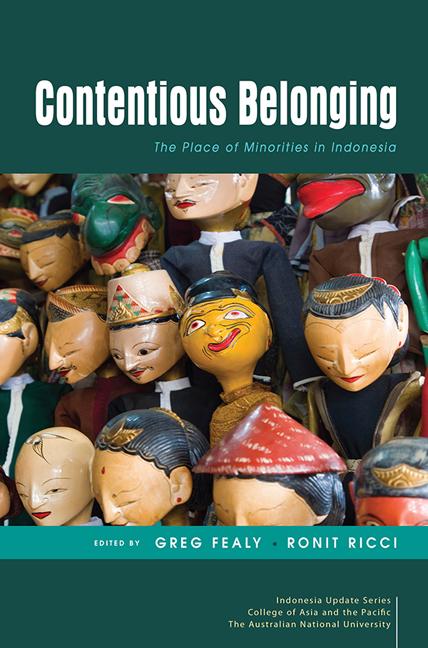Book contents
- Frontmatter
- Contents
- Tables and figures
- Contributors
- Acknowledgments
- Glossary
- Map
- 1 Diversity and its Discontents: an Overview of Minority–Majority Relations in Indonesia
- PART 1 HISTORY AND LAW
- PART 2 DISABILITY
- 5 Changing Laws, Changing Attitudes: the Place of People With Disability in Indonesia
- 6 Disability Inclusion in Indonesia: the Role of Islamic Schools and Universities in Inclusive Education Reform
- PART 3 SEXUALITY
- PART 4 RELIGION AND ETHNICITY
- PART 5 REFLECTIONS
- Index
- Indonesia Update Series
5 - Changing Laws, Changing Attitudes: the Place of People With Disability in Indonesia
from PART 2 - DISABILITY
Published online by Cambridge University Press: 06 September 2019
- Frontmatter
- Contents
- Tables and figures
- Contributors
- Acknowledgments
- Glossary
- Map
- 1 Diversity and its Discontents: an Overview of Minority–Majority Relations in Indonesia
- PART 1 HISTORY AND LAW
- PART 2 DISABILITY
- 5 Changing Laws, Changing Attitudes: the Place of People With Disability in Indonesia
- 6 Disability Inclusion in Indonesia: the Role of Islamic Schools and Universities in Inclusive Education Reform
- PART 3 SEXUALITY
- PART 4 RELIGION AND ETHNICITY
- PART 5 REFLECTIONS
- Index
- Indonesia Update Series
Summary
‘My parents never treated me any differently to my brothers and sisters. I was given the same responsibilities as my siblings and the same opportunities […] And [being brought up like that] was so useful for my sense of independence. As I became an adult, I was able to do things on my own without having to bother anyone else.’
– DewiDewi was born with a physical impairment and raised by a family who believed she was able to participate fully in the day-to-day activities of the family and the community. With the encouragement and support of her family, Dewi completed her education and is now the leader of the local branch of the Indonesian Association of Women with Disabilities, where she campaigns for the rights of other Indonesians with disability. By creating the conditions for Dewi to be educated and by supporting and encouraging her independence, her family challenged how most Indonesians think of people with disability—as being highly dependent, to be pitied and needing charity.
Stories like Dewi's are part of the reason that disability activists in Indonesia have campaigned so energetically for changes to how disability is conceptualised, legislated and funded by government organisations. For decades, being disabled in Indonesia, as in many other parts of the world, was seen as an impediment, a source of pity and a driver of acts of charity. This ‘welfare’ approach to disability was premised on the understanding that the source of the problem faced by people with disability was their impairments, and that support for people with disability was best delivered in the form of rehabilitation to ‘fix’ their impairments or through payments or other forms of charity. Over the course of the 1990s, the work of disability activists in the global north contributed to a significant shift in how disability was conceptualised, and therefore how support for people with disability was best delivered. The social model of disability, which places the onus of the problem not on the individual living with disability but rather on the social structures that make it difficult for those with disability to participate in society, has become the foundation for how disability is understood globally and, in turn, for how policy related to people with disability is formulated.
- Type
- Chapter
- Information
- Contentious BelongingThe Place of Minorities in Indonesia, pp. 77 - 94Publisher: ISEAS–Yusof Ishak InstitutePrint publication year: 2019



